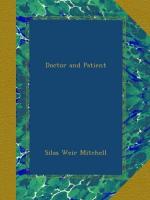Physicians are often enough tempted to give a simple placebo to patients who are impatient, and ask instant treatment when we know that time is what we want, either for study of present symptoms or to enable the growing disorder to spell itself out for us, as it were, letter by letter, until its nature becomes clear. The practice is harmless, but there is, of course, a better way, if we possess the entire confidence of the patient or his friends. But sometimes it is undesirable to give explanations until they can be securely correct, or haply the sick man is too ill to receive them. Then we are apt, and wisely, to treat some dominant symptom, and to wait until the disease assumes definite shape. So it is that much of what we thus give is mild enough. The restless mother is the cause with some doctors of much of this use of mere harmless medicines. I once expressed surprise in a consultation that an aged physician, who had called me in, should be so desirous of doing something, when I as earnestly wished to wait. At last he said, “Doctor, it is not the child I want to dose; it is the mother’s mind.” Perhaps the anecdote may not be lost on some too solicitous woman, who naturally desires that the doctor should be doing something just when he is most anxious to be doing nothing.
Men yet live who can remember when all of our knowledge of disease was acquired by the unaided use of the eye, the ear, and the touch. The physician felt the pulse, and judged of fever by the sense of warmth. He looked at the skin and tongue and the secretions, and formed conclusions, more or less just in proportion to the educated acuteness of his senses and the use he made of these accumulations of experience. The shrewdness of the judgments thus formed shows us, to our wonder, how sharply he must have trained his senses, and has led some to suspect that our easier and more exact methods and means may have led us to bestow less care in observation than did these less aided and less fortunate students. The conclusion is, I am sure, erroneous, and I am confident that the more refined the means the more do they train us to exactness in all directions, so that even what we now do with the eye, ear, or hand alone is better and more carefully done than when the senses had none of the training due to the use of instruments of precision. I may add that the results of their employment have also made it easy in many cases to dispense with them, and to interpret readily what has been won by the unassisted sense.
The history of precision in medicine is worth the telling, if only to teach the lay reader something of that vast struggle to know the truths of disease, which is little understood beyond the ranks of the most scholarly of my profession. The first step was due to Galileo. In 1585 he used his pendulum to record the pulse, in a fashion at which we smile to-day, and yet what he tried to do was the birth of precision in medicine. Keeping a finger on the




